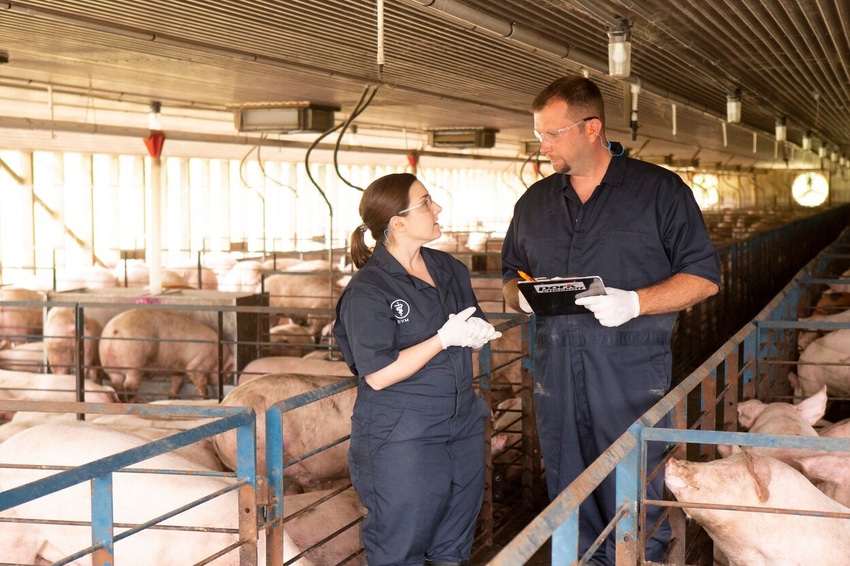Future of AASV not just about the pigs, but the people
Next generation swine veterinarian will need to focus on eliminating diseases, championing pig welfare and delivering solutions to farmers.
March 5, 2024

The American Association of Swine Veterinarians held its 55th Annual Meeting in Nashville, Tennessee, Feb. 24–27, at the Gaylord Opryland Resort. The theme this year, “Leading AASV into the Future”, emphasized the importance of acknowledging and embracing an AASV members’ role in the future of swine production and provision of food for the world.
Program chair and AASV President-elect Angela Baysinger called on the 2024 program planning committee to compile a scientific program where attendees could learn from the past and lead into the future. She challenged attendees to follow Albert Einstein’s approach: “Learn from yesterday, live for today, hope for tomorrow. The important thing is not to stop questioning.”
The annual meeting drew 1040 ,total attendees, including 104 veterinary students from 23 universities in the United States, Canada and Mexico. The total attendance also included 260 exhibit representatives from 98 companies and organizations and four media representatives. Including the United States, 22 countries were represented; 15% of attendees came from outside of the United States. These preliminary numbers are yet to be confirmed.
Preconference seminars included topics about diagnostic data, disease preparedness, swine business, pig livability, biosecurity, influenza, field research, and nutrition. Saturday’s Pig Livability: What Works, What Doesn't preconference seminar drew the most preregistered attendees. As always, the Swine Medicine for Students preconference seminar was well attended by veterinary students. Sunday afternoon, veterinary students highlighted their research and experience to a large crowd during the student seminar.
The ever-popular Dr. Max Rodibaugh Practice Tips preconference seminar was voluntarily judged by Bryant Chapman, Kelly Greiner and Lisa Tokach, and chaired by Melissa Billing. Will Fombelle’s presentation titled, “Triaging emergencies: Be the calm after the storm,” received the top prize, followed by Rachel Stika Jensen’s, “Round up the pigs,” and Susan Detmer’s, “Catching the flu: Best practices for successful sampling.”
Joel Nerem, chief veterinary officer at Pipestone, opened the Monday general session with the Howard Dunne Memorial Lecture. During his presentation titled “Swine veterinarians: Who are we and where are we going?” he encouraged veterinarians to focus on the pig, the farmer and the consumer. He defined a “next generation swine veterinarian” as someone who eliminates diseases, welcomes next generation biosecurity, promotes foreign animal disease preparedness, develops traceability solutions, champions pig welfare, and embraces consumer preferences and delivers solutions to farmers.
Chris Rademacher, clinical professor and swine extension veterinarian at Iowa State University, presented the Alex Hogg Memorial Lecture titled “Past, present, and future challenges for the swine veterinary profession.” After a tribute to Hogg and the many mentors and experiences that shaped his life, Rademacher acknowledged the challenges of swine veterinary education, recruitment and retention of the next generation of swine veterinarians, and an evolving profession. He recognized any solution will require a different way of thinking about swine veterinary practice. He said, “The key to relationships is understanding people. We raise pigs, but we are still in the people business.”
Speakers during the second half of the Monday general session described disease elimination and eradication challenges, including a zombie apocalypse approach to biosecurity, biocontainment and disease control and elimination.
The Monday afternoon concurrent sessions challenged veterinarians to think critically about sustaining the farm in the face of evolution, moving disease elimination beyond theory and into success into the future, and what immunology tools are available today and those in a toolbox of the future. The Tuesday general session encouraged attendees to refocus on the end goal – producing safe, wholesome and high-quality pork.
While continuing education is incredibly important to attending veterinarians, some of the most valuable takeaways from each annual meeting might be the personal and professional connections made outside of each session. In addition to the scientific sessions, avant-garde ideas and generous sponsorships allow the AASV to host professional and student social networking events, personal and professional development opportunities, self-care experiences, and receptions to celebrate and recognize student, college and mentor accomplishments.
For the second year, the AASV Foundation cosponsored the Monday luncheon with the AASV. Recipients of AASV Foundation-funded programs, including veterinary student scholarships, Alex Hogg Memorial Scholarships, Zoetis Foundation and Dr. Conrad and Judy Schmidt Family Student Debt Relief Scholarships, and research grants were announced. The Foundation also honored its newest Heritage fellows, Hans and Darci Koehnk. AASV announced the recipients of the student podcast award (Kaci Way) and the practice tip winners.
The AASV Awards Reception was held Monday night, followed by the AASV Foundation’s annual fund-raising auction Jeff Harker, 2020 AASV president and 2024 AASV Awards Selection Committee chair, introduced the recipients of the Swine Practitioner of the Year Award ( Matt Allerson), the Howard Dunne Memorial Award (Paul Yeske), the Meritorious Service Award (Nathan Winkelman), the Outstanding Swine Academic of the Year Award (Rodger Main), the Technical Services/Allied Industry Veterinarian of the Year Award (Melissa Billing), and the Young Swine Veterinarian of the Year Award (Dylan Lape). Read more about the awardees here.
You May Also Like



